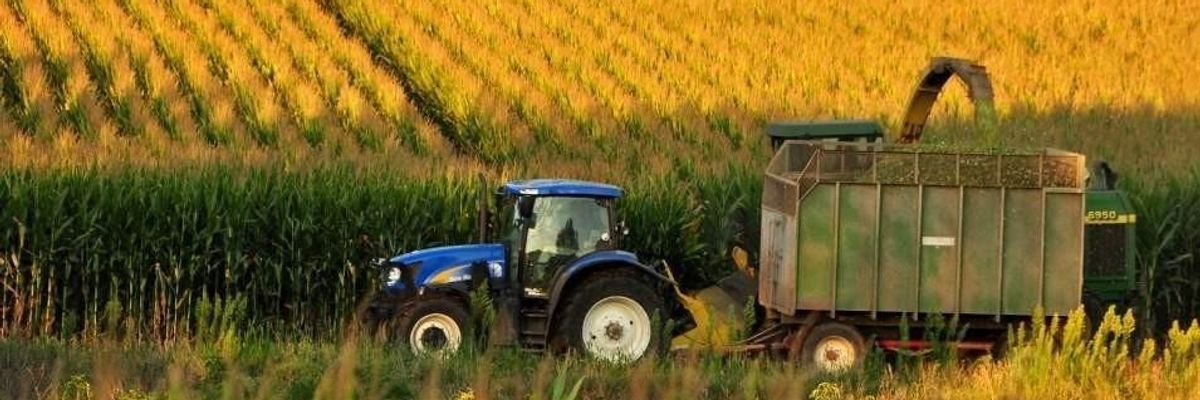For family farmers like Hans Breitenmoser, the odds of catching COVID-19 on the job are slim. Social distancing is not exactly a challenge when you're farming more than 1,300 acres in rural Wisconsin.
But Breitenmoser is one of many Wisconsin farmers who are showing solidarity with others in the food supply chain who are at the pandemic's epicenter -- meatpackers and food processing plant employees.
According to the Food and Environment Reporting Network, more than 65,000 food production industry workers have tested positive for COVID-19, and at least 268 have died.
Through the Wisconsin Farmers Union, Breitenmoser is part of a farmer-labor alliance calling for increased testing and other protections for these vulnerable workers, along with measures to insulate family farmers from pandemic-related economic losses.
For Breitenmoser, who's always lived on his family's Lincoln County dairy and grain farm, joining forces with this heavily immigrant factory workforce makes total sense.
While the CEOs are profiting, food workers of all kinds are taking serious risks.
"If you look at where value comes from and where the money goes in the food industry," Breitenmoser told me, "I, as Joe Farmer, have more in common with Bob, the guy in the slaughtering plant, than I do with the CEO of a foreign agribusiness corporation."
While the CEOs are profiting, food workers of all kinds are taking serious risks. Wisconsin's largest COVID-19 outbreak so far was in a JBS pork processing facility in Green Bay, where 348 employees became infected.
As a foreign company, JBS is not required to disclose how much their CEO makes. But at Tyson's, the second-largest U.S. meat processor, the top executive made more than $10 million last year. "A disproportionate amount of profits goes straight to the top -- to people who have very little to do with raising and slaughtering those cows," says Breitenmoser.
The Wisconsin initiative is not the first time farmers have joined with meatpacking workers to demand stronger COVID-19 protections.
In May, the United Food and Commercial Workers union, which represents over 250,000 meatpacking and food processing workers, partnered with several groups representing American farmers and ranchers to call on companies and governments at all levels to take stronger steps to safeguard frontline workers.
"From frontline food processing workers to farmers and ranchers, we are all critical to keeping American families fed during this crisis," UFCW International President Marc Perrone said in a statement. "Enacting strong worker safety standards inside meatpacking plants will help people outside of them as well and ensure every link in our food supply chain is secure."
Breitenmoser explained the interconnections this way: "Since so few companies control the meatpacking industry, if COVID shuts down a plant, the meatpacker is out of a job, the consumer pays more for a pound of hamburger, and the farmers like me get lower prices. Everybody gets screwed."
He'd like to see the United States eventually adopt supply management systems like they have in Canada, which ensure producers a decent, stable price, instead of relying on foreign export markets.
"You don't see Canadian farmers asking for government handouts," Breitenmoser points out. Meanwhile, under President Trump's trade war, federal government payments to farmers are expected to hit a record $46 billion this year.
What does he see as the most urgent change? Getting money out of politics.
"Right now we've got the Cargills and the Monsantos in D.C. lobbying for the food industry," Breitenmoser says. "Unless and until we get money out of politics, we'll never get the public policy that farmers, meatpackers, and all the rest of us need."
Right now, farmers and meatpackers may not have the financial resources their employers spend on lobbying. But, in the face of a deadly pandemic and the president's destabilizing trade wars, they do have each other.

